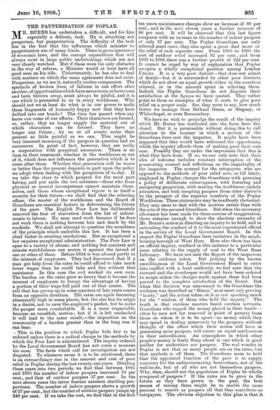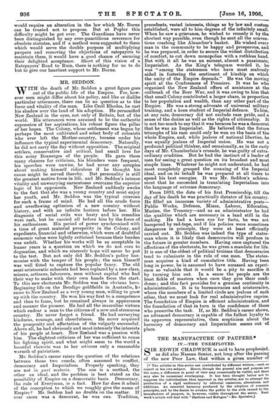111.6 PAUPERISATION OF POPLAR.
MR. BURNS has undertaken a difficult, and for him especially a delicate, task. He is attacking, not pauperism, but pauperisation. The difficulty of the task hes in the fact that the influences which minister to pauperisation are of many kinds. There is gross ignorance of economic laws, and the corrupt expenditure that will always exist in large public undertakings which are not very closely watched. But if these were the only obstacles in the way of reform, a Minister would at least have all good men on his side. Unfortunately, he has also to deal with matters on which the same agreement does not exist. Pauperism, as we see it, naturally excites compassion. The spectacle of broken lives, of failures in one effort after another, of opportunities which have never come, or have come and been thrown away, must always be pitiful, and it is one which is presented to us in every workhouse. Why should not we at least do what is in our power to make these fragments of humanity happy now that they have drifted into our hands ? The time has passed when any harm can come of our efforts. Their characters are formed, or, rather, they no longer supply the material out of which characters can be formed. They have no longer any future ; let us at all events make their present as little painful as we can. This might be very innocent reasoning if the paupers in question had no successors. In point of fact, however, they are really a corporation with perpetual succession. There is no item in their treatment, whether in the workhouse or out of it, which does not influence the generation which is to come after them. Whether that generation will be worse or better than the present depends in part upon the policy we adopt when dealing with the pauperism of to-day. If we take the class to which paupers for the most part belong, and put aside the two extremes—those who from physical or mental incompetence cannot maintain them- selves, and those whose exceptional vigour is in itself a security for their future—we shall find that the relieving officer, the master of the workhouse, and the Board of Guardians are essential factors in determining the future of the poor. The English Poor Law has deliberately removed the fear of starvation from the list of induce- ments to labour. No man need work because if he does not work there is nothing between him and death by the roadside. We shall not attempt to question the soundness of the principle which underlies this law. It has been a chief factor in averting revolutions. But so exceptional a law requires exceptional administration. The Poor Law is open to a variety of abuses, and nothing but constant and minute watchfulness can secure it against the inroad of one or other of them. Before 1834 it was abused partly in the interest of employers. They had discovered that if a man got help from the rates he could afford to take much lower wages than he could take and live without that assistance. In this case the evil worked its own cure. The burden on the rates grew so heavy that it became the interest of employers to forego the advantage of having a portion of their wage-bill paid out of that source. The evil that has grown up in some quarters of late years comes from an opposite direction. The rates are again becoming abnormally high in some places, but the rise has its origin in a desire, not to save the employer's pocket, but to make the pauper more comfortable. It is a more respectable, because an unselfish, motive ; but if it is left unchecked it will lead to the same result,—the imposition on the community of a burden greater than in the long run it can bear.
• This is the position to which Poplar bids fair to be reduced unless there is a radical change in the methods by which the Poor Law is administered. The inquiry ordered by the Local Government Board has not come a. moment too soon. The facts which call for investigation are not disputed. To whatever cause it is to be attributed, there is an extraordinary rise in the amount and cost of poor relief in Poplar during the last twenty-one years. Dividing these years into two periods, we find that between 1885 and 1895 the number of indoor paupers increased 70 per cent., and that of outdoor paupers 37 per cent. In the next eleven years the latter feature assumes startling pro- portions. The number of indoor paupers shows a. growth of 37 per cent., but the number of outdoor paupers jumps up 249 per cent. If we take the cost, we find that in the first ten years maintenance charges show an increase of 80 per cent., and in the next eleven years a further increase of 86 per cent. It will be observed that this last figure compares with an increase in the number of indoor paupers of only 37 per cent. The Poplar Guardians not only relieved more cases, they also spent a great deal more oc the relief of each separate case. From 1885 to 1895 the cost of outdoor relief increased 92 per cent., and from 1895 to 1906 there was a further growth of 222 per cent. It cannot be urged by way of explanation that Poplar occupies a wholly exceptional position among London Unions. It is a very poor district—that does not admit of denial—but it is surrounded by other poor districts which do not show an equal growth either in the numbers relieved, or in the amount spent in relieving them. Indeed, the Poplar Guardians do not disguise their satisfaction at the figures we have quoted. They rather point to them as examples of what it costs to give poor relief on a proper scale. See, they seem to say, how much better we manage than Bethnal Green, or Stepney, or Whitechapel, or even Bermondsey.
We have no wish to prejudge the result of the inquiry which Mr. Burns has instituted into the facts here dis- closed. But it is permissible without doing this to call attention to the manner in which a section of the Guardians have met the inspector. It might have been supposed that they would have welcomed the opportunity which the inquiry affords them of making good their own case. Possibly they are under the impression that this is what they have done. If so, we can only note that their idea of welcome includes constant interruption of the prosecuting counsel and reflections on the impartiality of the inspector. The counsel for the ratepayers, who are opposed to the methods of poor relief now, or till lately, employed in Poplar, charges the Guardians with pursuing a policy of deliberate extravagance, with fostering and pampering pauperism, with making the workhouse unduly attractive, and with tempting paupers from other districts by the prospect of the superior comforts of the Poplar Workhouse. These statements may be needlessly rhetorical. They may seem to deal with the motives rather than with the acts of the accused Guardians. But when the necessary allowance has been made for these sources of exaggeration, there remains enough to show the absolute necessity of Mr. Burn's action in directing an inquiry to be held, and in entrusting the conduct of it to the most experienced official in the service of the Local Government Board. In this respect the Poplar Guardians have imitators in the neigh. bouring borough of West Ham. Here also there has been an official inquiry, confined in this instance to a particular issue relating to the supply of coal to the West Ham Infirmary. We have not seen the Report of the inspectors on the evidence taken. But judging by the known unwillingness of the Local Government Board to enter into conflict with a local authority, we feel sure that the steward and the storekeeper would not have been ordered to resign unless the charges made against them had been proved to the complete satisfaction of the Board. But when this decision was announced to the Guardians the evidence was described as "flimsy," as at most only proving "laxity," and the action taken on it as not speaking much for the " wisdom of those who held the inquiry." The truth is that careless masters breed careless servants. Guardians who regard the money placed in their hands— often by men not far removed in point of poverty from those on whom it is to be spent—as money which they may spend in dealing generously by the paupers, without thought of the effect which their action will have in generating more paupers, will create an equal carelessness in their subordinates. An atmosphere in which other people's money is freely flung about is one which is good neither for authorities nor paupers. The real wonder in Poplar is not that so many people are on the rates, but that anybody is off them. The Guardians seem to hold that the appointed function of the poor is to supply occasions for the undiscriminating benevolence, not of the well-to-do, but of all who are not themselves paupers. Why, then, should not the population of Poplar be wholly composed of paupers ? If the rates are to grow in the future as they have grown in the past, the best means of raising them might be to enable the same persons to receive as paupers all that they contribute as ratepayers. The obvious objection to this plan is that it would require an alteration in the law which Mr. Burns can be trusted not to propose. But at Poplar this difficulty might be got over. The Guardians have never been distinguished by any over-punctilious reverence for obsolete statutes, and if a method were suggested to them which would serve the double purpose of multiplying paupers and removing the objections of ratepayers to maintain them, it would have a good chance of securing their delighted acceptance. Short of this vision of a Ratepayers' Road to Ruin, there is nothing for us to do but to give our heartiest support to Mr. Burns.











































 Previous page
Previous page